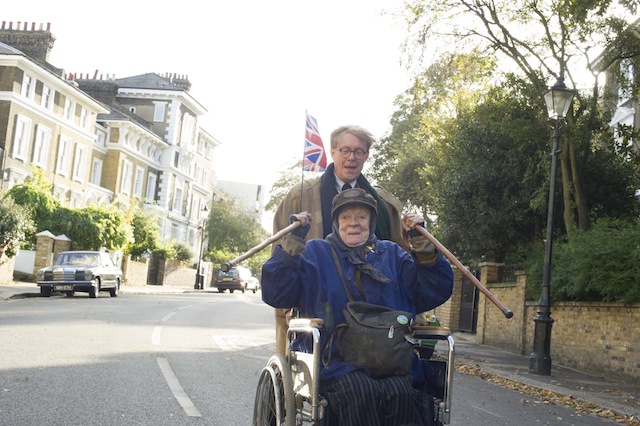‘The Lady in the Van’ The creative forces behind “The Lady in the Van” know what you’re thinking. You think it’s one of those cute English dramedies that crop up every now and then. They know you expect it to concern an incorrigible but ultimately lovable geezer played by Maggie Smith. You’re ready for her to warm the hearts of the coldhearted richies who’ve gentrified a once-cheap street in London, upon which she and her discombobulated van take residence for some 15 years. Failing that, you expect her to at least cheer up our hero, one Alan Bennett (Alex Jennings), an esteemed, grumpy writer who becomes the closest thing to a confidante. RELATED: We watched all the Oscar nominated Animated and Live Action Shorts Thing is, it is the movie you expect, only more salty, more realistic and a little bit meta. For one thing, Alan Bennett is that Alan Bennett — i.e., the real-life author of “The Madness of King George III,” “The History Boys” as well as “The Lady in the Van,” the autobiographical novel whose adaptation you’re watching. (Jennings’ Bennett is uncannily, scarily spot-on, so much that when the real Bennett pops in at the end he seems like an imposter.) For another, Smith’s “Miss Shepherd” (real name a point of debate) is only partway adorbs, and greatly uninterested in anyone but herself. Late in, Bennett rattles off an epic stream of invective about her, citing her stubbornness, her racism and other maladies and prejudices. At that point she’s some 10 years into her tenure as an unwanted neighbor. An epic about-face is unlikely. A lengthy confessional shortly before her death, however, is in the cards, because “The Lady in the Van,” despite its self-awareness, can’t help being true to its nature. And it’s nature is being a funny, likable film, made in a bourgeois fashion by Nicholas Hytner (who also directed Bennett’s “King George”) of light scenes held together by tasteful “classical” music. It’s that kind of movie, but one that occasionally reveals its mordant underbelly. Bennett and Miss Shepherd bond, such little that they do, because they’re both irritable and prone to self-imposed isolation. Bennett lives alone and, being a professional writer, likes to talk to himself — which here means two Alex Jenningses sporadically sharing the screen a la Jeremy Irons in “Dead Ringers” (or Hayley Mills in “The Parent Trap”). His neighbors, including a grouchy Roger Allam, are of two minds about letting her squat on their block. The occasional poo lodged in his trashcan aside, Bennett is all for it. RELATED: 16 indies to see before the summer blockbuster season The movie, like the novel, puts its own anxieties in the text. Bennett, whose work often (but far from always) deals with his native Northern England, and sometimes he is heard worrying that he’s simply peddling bourgeois Britishness to the masses, here and elsewhere. He knows that writing a book about Miss Shepherd, and then making a movie version, too, means he opens himself up to profiting off of a poor woman’s profound suffering. He doesn’t find a way to pardon himself from his own accusations, but he also doesn’t try to paint himself as a mere savior to the downtrodden. “I hate caring,” Bennett quips at one point, and any saccharine moments — say, a bit where he hesitantly joins her in caterwauling down the street in a wheelchair — occur with great reluctance. It hits the expected quaint English dramedy marks, but it does it with huge caveats and great pissiness. In the end, its good charm, cranky though it is, saves a film that could have only been pleasant.
Director: Nicholas Hytner
Stars: Maggie Smith, Alex Jennings
Rating: PG-13
3 (out of 5) Globes
‘The Lady in the Van’ is a grouchier version of a nice English dramedy

Sony Pictures Classics
Follow Matt Prigge on Twitter @mattprigge






















